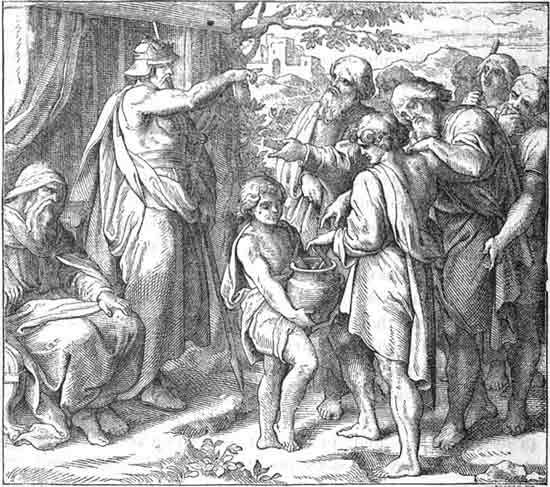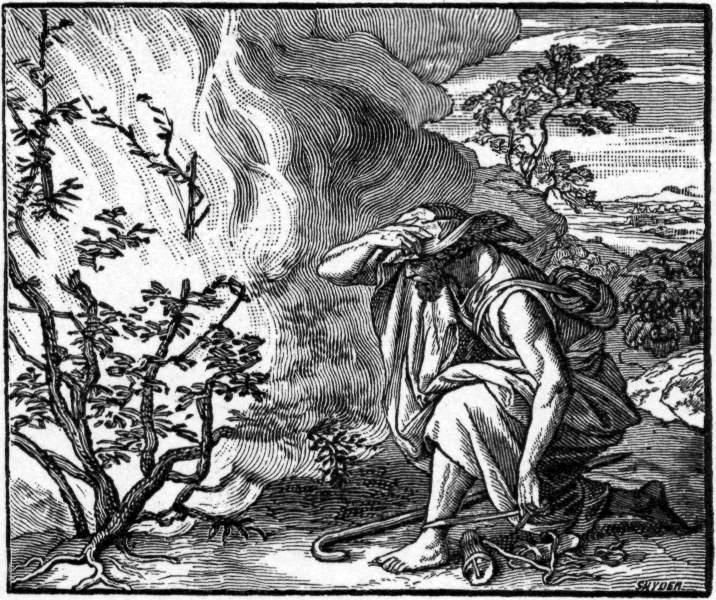
The death of Moses drowned the Israelites in a sea of sorrow. It was now Joshua, the trusted aide of Moses, who had assumed his responsibilities. It was the duty of the 82 year-old brave Joshua to take the Israelites to the ‘Promised Land’. To ensure the passage of such a large congregation of Jews from one region to another that happened to be so far away, was a humongous task and it required a leader befitting the responsibility. He would have to possess enterprise, valour and restraint. He would have to be endowed with the qualities of a commander and also those of a compassionate guide. And Joshua fitted this role to the T. He had all that the circumstances called for at the given moment.
Joshua was a descendant of Ephraim, one of the two sons of Joseph. As for his faith in God, it could very well match that of Moses. The word of God was everything for him. Joshua was certain that success would be his if he sincerely followed God’s laws, i.e. the ‘Torah’ and the word of God that He pronounced from time to time. While bestowing upon Joshua the responsibilities of Moses, God gave him the blessing of invincibility against all the enemies. Joshua firmly believed in the blessing and accordingly started making all his further plans carefully by keeping faith in victory.
The Jews mourned the death of Moses for a month as per the prevalent custom. They gradually recovered and even began to steady themselves. They were now all set to move ahead in their journey.
Joshua sent to Canaan, his highly trusted aides Caleb and Phinehas, as scouts, to gauge the response that they would receive there. After spending an entire day among the common Canaanites they became aware that everyone in Canaan was learnt of the impending Israelite charge and feared it.

Caleb and Phinehas stayed for the night at a lodge in the Canaanite city of Jericho. The lodge was owned and run by a lady named ‘Rahab’. The news of the two Israelites staying at Rahab’s lodge reached the local king and he sent for his troops to arrest them. But in her heart, Rahab had always favoured and admired the Jews. She hid them at a safe, secret place while misleading the search party of the soldiers to an altogether different location at a good distance away from there. After deceiving the troops she quickly guided the two Israelites to a safe escape route. Caleb and Phinehas gratefully thanked Rahab and promised her to return the favour. It was then that she said to them, ‘I was ten when the Jews left Egypt. I had heard of the huge miracles that had happened then. By all possible means I have continued to keep track of the Israelites, who kept wandering the desert over the last forty years. Currently there is a lot of fear among the people here due to your probable strike.” She said, adding that she had respect for the God of the Israelites. Touched by her words they told her to tie a cord of a specific colour to her window. This would work as an indicator and the Jews would spare her, her house and her family during the attack. They went back to the Israelite camp and reported to Joshua the details from Canaan. They told him about Rahab and also informed him that most of the Canaanites were scared and were living with the dread of the impending attack of the Jews in their heart.
Joshua then sent an appeal to the kings, the tribal chieftains and the commoners of Canaan. The appeal read: – ‘We the Israelites are coming to live in the land that was promised to us by God. We seek your co-operation’. The appeal offered three alternatives: they could either leave the land or surrender and have friendly relations with the Israelites or be ready to fight them.
The stories related to the exodus, to the 40 years that the Israelites wandered the desert and of course those related to the miracles performed by God to save them from enemies and calamities had spread across the land of Canaan and the arrival of the Israelites was a cause for concern and fear for the Canaanites. To the exception of a few kings, most therefore, opted for either the first or the second alternative.
It was now time to set foot on the land of Canaan. But there was a hurdle that they faced – the River Jordan. It was only the Jordan that stood between them and Canaan! Moreover, it was overflowing.
But God promised Joshua that He would ensure that the Israelites cross the River Jordan and so Joshua, with complete and ardent faith in God, decided to cross the river. In keeping with God’s instructions, Joshua decided the order in which the Israelites would cross the Jordan – The High Priest carrying the ‘Ark of the Covenant’ along with other priests would lead the Israelites. They would be followed by Joshua himself and his other chieftains who would in turn be followed by the common Israelites.
Joshua lovingly recalled the Almighty God to his mind and set about the journey of traversing the river….
….and it was here that a miracle similar to the one that had happened forty years back while crossing of the Red Sea, recurred. The moment the High Priest set foot in the Jordan River, it parted in a way similar to which the Red Sea had parted, making way for the Israelites to cross over to the other side of its bank, so says the story. As per God’s command, Joshua asked the chieftains of the ‘Twelve Tribes of Israel’ to collect a stone each from the pathway created in the riverbed of the Jordan, an act meant to remind him and the Israelite descendants of this gesture of grace on the part of God.

As instructed by God, the priests carrying the ‘Ark of the Covenant’ halted midway in the riverbed and waited until all the Israelites had crossed the Jordan. The priests crossed over only after the last Israelite managed to cross the river and the moment the last of the priests set foot on the other side, the River Jordan that had parted to make way for the Israelites, resumed its natural flow. It was once again the same river that the Israelites had seen overflowing, so says the story.
The Jews had thus set foot in their very own land, the land that was rightfully theirs – the land of Canaan! (To be continued…)














